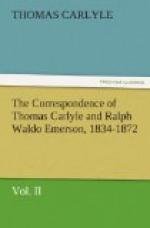You ask after Cromwell: ask not of him; he is like to drive me mad. There he lies, shining clear enough to me, nay glowing, or painfully burning; but far down; sunk under two hundred years of Cant, Oblivion, Unbelief, and Triviality of every kind: through all which, and to the top of all which, what mortal industry or energy will avail to raise him! A thousand times I have rued that my poor activity ever took that direction. The likelihood still is that I may abandon the task undone. I have bored through the dreariest mountains of rubbish; I have visited Naseby Field, and how many other unintelligible fields and places; I have &c., &c.:—alas, what a talent have I for getting into the Impossible! Meanwhile my studies still proceed; I even take a ghoulish kind of pleasure in raking through these old bone-houses and burial-aisles now; I have the strangest fellowship with that huge Genius of DEATH (universal president there), and catch sometimes, through some chink or other, glimpses into blessed ulterior regions,—blessed, but as yet altogether silent. There is no use of writing of things past, unless they can be made in fact things present: not yesterday at all, but simply today and what it holds of fulfilment and of promises is ours: the dead ought to bury their dead, ought they not? In short, I am very unfortunate, and deserve your prayers,—in a quiet kind of way! If you lose tidings of me altogether, and never hear of me more,—consider simply that I have gone to my natal element, that the Mud Nymphs have sucked me in; as they have done several in their time!
Sterling was here about the time your Letters to him came: your American reprint of his pieces was naturally gratifying him much.* He seems getting yearly more restless; necessitated to find an outlet for himself, unable as yet to do it well. I think he will now write Review articles for a while; which craft is really, perhaps, the one he is fittest for hitherto. I love Sterling: a radiant creature; but very restless;—incapable either of rest or of effectual motion: aurora borealis and sheet lightning; which if it could but concentrate itself, as I [say] always—!—We had much talk; but, on the whole, even his talk is not much better for me than silence at present. Me miserum!
-------- * “The Poetical Works of John Sterling,” Philadelphia, 1842. --------
Directly about the time of Sterling’s departure came Alcott, some two weeks after I had heard of his arrival on these shores. He has been twice here, at considerable length; the second time, all night. He is a genial, innocent, simple-hearted man, of much natural intelligence and goodness, with an air of rusticity, veracity, and dignity withal, which in many ways appeals to one. The good Alcott: with his long, lean face and figure, with his gray worn temples and mild radiant eyes; all bent on saving the world by a return to acorns and the golden age; he comes before one like a kind of venerable Don Quixote, whom nobody can even laugh at without loving!....




